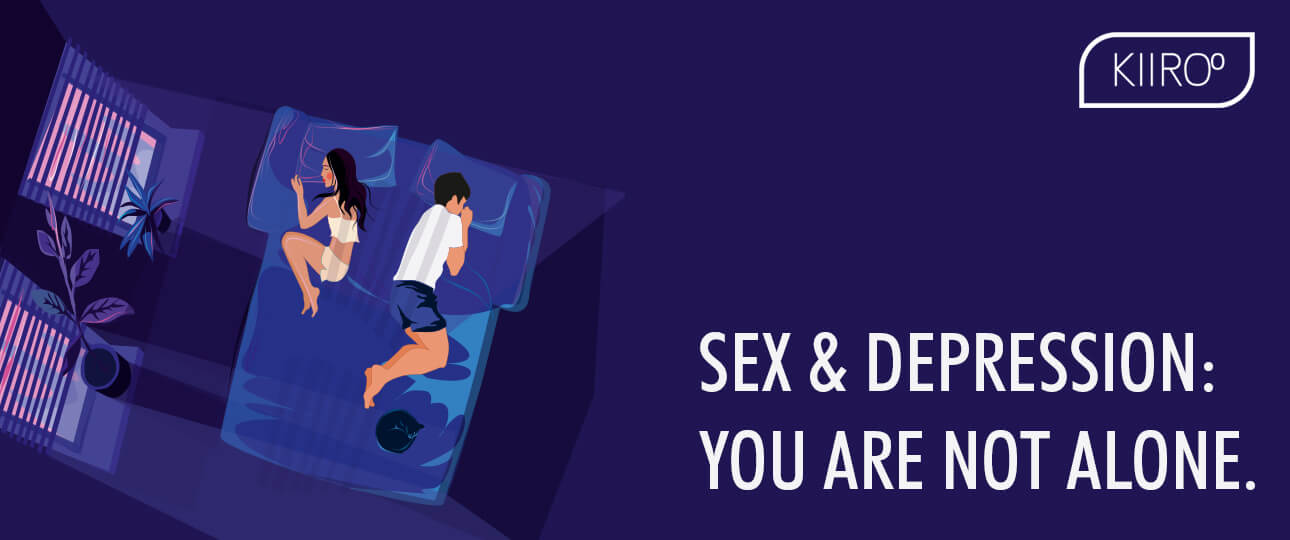Overcoming Obstacles
One of the things that makes depression and sex such a terrible disease is that it manages to convince each of its victims that the problem is them. For many years, it was something that no one talked about, so every person battling depression and sex was expected to go it alone.
It’s no secret that depression can have an effect on your sex life. Some advice centers around faking it ’til you make it, or the emphasis on simply functioning sexually.
WHAT IS SEXUAL PERFORMANCE ANXIETY?
Like we said earlier, there’s a lot of pressure when it comes to sex. Whether it’s genital size, the need to make your partner orgasm, or stamina; combine these fears with a bad experience or a lack of sexual knowledge, and you have the makings of sexual performance anxiety. Now, if you’re not sure you have performance anxiety, it’s important to know it can manifest in different ways.
Impotence
Anxiety can hinder a sexual experience before it even starts. Impotence is a common side effect of sexual performance anxiety as the body needs to prepare itself for sex. But if you’re suffering from performance anxiety, your body isn’t working properly. Thus, causing impotence.
Inability to orgasm
Anxiety can affect the entire sexual experience, from beginning to end. Performance anxiety has the ability to completely prevent a person from orgasming. This is because the body isn’t in a relaxed state, and if you want to orgasm, you need to be in the present.
Premature Ejaculation
Men can experience premature ejaculation due to anxiety. Though in many cases, premature ejaculation is satisfying, for some men, it can cause emotional distress. This distress can further manifest in future experiences.
Often, there’s more focus on helping men with depression and sex is to get and maintain an erection than there is on people of any gender taking control of their pleasure. However, many women suffer from anorgasmia as a result of taking medication like SSRIs.
This doesn’t mean that SSRIs are inherently bad, of course. Many people have found a new balance, a new equilibrium, thanks to anti-depressants. It’s just that many of these drugs have sexual side effects.
If we don’t talk about them, then everyone who’s experiencing them is left to think they’re alone, they’re broken, maybe that they’re stuck this way forever. (Note: Always ask your doctor before you make any changes, and if possible, see a therapist concurrently. A multidimensional approach is often best.)
Crista Anne, a blogger, long-time sex educator, and sex-positive mother extraordinaire has decided to take back her sexual pleasure in the form of #OrgasmQuest.
Crista was recently prescribed antidepressants, which have made a positive difference in her daily life. Her partnered sex life is still great, but she misses her solo sex life. It had always been an important part of who she was: “I came out of the womb depressed, but I also came out of the womb with one hand on my clit and it’s really never left,” she says.
#OrgasmQuest has received national attention and, as they say, gone viral. It turns out that many more people – of all genders – find themselves needing to embark on their own Orgasm Quest. This is a much more prevalent situation in our society than perhaps we’d previously acknowledged.
Another champion of sex and depression is JoEllen Notte, of the blog The Redhead Bedhead. JoEllen has been open about her mental health struggles and triumphs on her blog for a few years now and is often regarded as one of the leading voices in the sex and depression conversation.
JoEllen has written some fantastic articles on a wide range of topics related to sex and depression: From how to stay sex positive while you’re dealing with depression, to why “just do it” is a bad motto for sex while depressed, to practicing self-care. JoEllen’s blog contains a wealth of information, and you should absolutely check it out.
6 WAYS TO OVERCOME SEXUAL PERFORMANCE ANXIETY
Remember, anxiety is a psychological condition; so, it’s all in your head. That being said, you can overcome it. Here are six ways to do it.
Talk to your partner
It may feel uncomfortable to talk about this with someone you’re sleeping with. But, if you’re about to be intimate with them, there’s no point hiding it. If you’re experiencing anxiety and you’re struggling to have an erection, tell your sexual partner what’s going on. By talking to them about it, you immediately address the problem, reducing your anxiety.
Plus, by having your partner aware, they’ll be able to support you and help you. If your partner doesn’t know, they could misinterpret it as something caused by them, which will cause unnecessary conflict. Your partner isn’t going to judge you; they’ll want to help you.
Get into Foreplay
Foreplay is usually overlooked in sex, to begin with. So, by focusing more on foreplay, it’ll benefit both of you. If you’re anxious about intercourse, spend more time in foreplay. You’ll be able to spend intimate time with your partner without the added pressure. And that’s really what you need. Intimacy without pressure. If that means refraining from intercourse and focusing on acts like foreplay, then you should do that.
Think outside the box
There’s no textbook method for having sex. Many men and women believe there’s a specific way to have sex. For example, you make out with each other, perform oral sex, and then have intercourse.
Now, there’s nothing wrong with this order, but this isn’t the only way to have sex. It doesn’t have to have a linear direction. Drop the A-B-C-D approach to sex, and switch things up. Not only will you bring more variety to the table, but you’ll also get rid of this cookie cutter notion of sexual activity.
Understand the human body isn’t perfect
Maybe in the movies, all the men are perfectly toned, tanned, and hung, but in reality, that’s not the case. There’s no such thing as a perfect body, and perfectionism usually plays a role in performance anxiety. You’re not going to necessarily make your partner orgasm every time you have sex. Your erection isn’t always going to be like a rock. Many things affect the human body, whether it’s stress, food, exercise, and mental health. You’re human, and you need to drop the unrealistic expectations you place on yourself.
Try the stop/start method
If you’re finding you prematurely ejaculate, there are methods you can use to control it. By training your body not to ejaculate, you’ll be able to last longer during sex. The stop/start method lets you get close to ejaculating, but then stopping until you calm down. You then build up to climax again and stop before ejaculation and repeat until you’re ready to finish. You can do this on your own when masturbating or with your partner. It’ll help retrain your body, and give you more control in bed.
Talk to a sex therapist
If you’ve tried the above tips, and nothing seems to be working, then why not speak to a sex therapist? They’re specially trained in dealing with sex-related issues, such as sexual dysfunction, and will be able to help you find the root cause of your problem. You should be able to enjoy sex, and not see it as something to fear. A sex therapist will be able to get you on the right track and remove all negative thoughts.
Though performance anxiety is prevalent with men, it’s something you can overcome. It’ll take time and plenty of practice, but eventually, you’ll be able to enjoy having a healthy sex life and be present in the moment.
Sex blogger DizzyGirl, of Toy Meets Girl, began sex toy reviewing in an effort to find something that would beat her anorgasmia (inability to climax). In the fabulous post “How DizzyGirl Got Her Groove Back”, she outlines the methods that have worked for her, while also acknowledging that you should seek assistance from a medical professional (A+ advice).
While it may seem counterintuitive to say “This works for me, it may not work for you,” in fact, it’s just helpful to get the conversation started. Letting people know that they aren’t alone makes a big difference.
One thing that all of these journeys have in common is that adult toys have played a role. Sex toys can be amazing tools for those who find orgasm difficult. Sex with a partner comes with its own unique kind of pleasure; even if you don’t climax, you get the skin to skin touch, a sense of closeness.
But for many, orgasms are still elusive. We hope that KIIROO devices may be able to help. Onyx+ provides a very different kind of stimulation, like nothing you’ve felt before. New stimulation can sometimes help reawaken sexual responses. Similarly, Pearl2 also has a powerful motor and can be used clitorally or for G-spot stimulation.
Our goal at KIIROO is to give the world another possibility of intimacy and sexual pleasure. If we can make a difference in people’s lives, then we’ve done our job.
YOU MAY ALSO LIKE:








